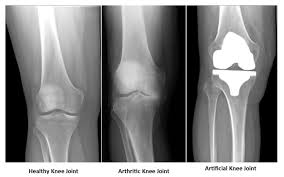Total Knee Replacement: What You Need to Know in 2025
Who Needs a Knee Replacement?
You might be a candidate for TKR if:
- You have chronic knee pain that limits daily activities
- Conservative treatments (like physical therapy or injections) haven’t helped
- Knee stiffness and swelling worsen over time
- Your X-rays show joint damage or bone-on-bone contact

Common Conditions Leading to TKR:
- Osteoarthritis
- Rheumatoid arthritis
- Post-traumatic arthritis
- Knee deformities or severe cartilage loss
What Happens During Knee Replacement Surgery?
During the procedure:
- The surgeon removes the damaged bone and cartilage from the femur, tibia, and patella.
- These parts are replaced with metal and plastic prosthetics.
- The new joint mimics natural knee motion while reducing pain and improving function.
The surgery usually takes 1 to 2 hours and is often performed under regional or general anesthesia.
Recovery After Total Knee Replacement
Recovery time varies, but here’s a general timeline:
TimelineRecovery MilestoneWeek 1–2Begin walking with a walker, pain managementWeek 3–6Improve range of motion, transition to caneMonth 3Resume low-impact activities, minimal painMonth 6–12Full recovery and return to normal function
Physical therapy plays a critical role in regaining mobility and strength. Most patients can expect significant improvement in pain and movement by the third month.
Risks and Complications
Like all surgeries, knee replacements carry risks. These include:
- Infection
- Blood clots
- Implant loosening or wear
- Nerve damage
- Persistent pain or stiffness
However, serious complications are relatively rare—less than 2% in most cases.
Tips for a Successful Knee Replacement Recovery
- Follow your rehab plan: Stick to prescribed physical therapy.
- Prepare your home: Remove tripping hazards, install handrails or raised toilet seats.
- Eat a balanced diet: Proper nutrition aids healing.
- Manage expectations: Full recovery takes time; improvement is gradual.
- Stay active (safely): Walking, swimming, and biking are great long-term exercises.
How Long Does a Knee Replacement Last?
Modern implants can last 15 to 25 years or more. Advances in materials and surgical techniques have made knee replacements more durable than ever before.
Cost of Knee Replacement Surgery in 2025
In 2025, the average cost in the U.S. ranges between $30,000 and $50,000, depending on:
- Insurance coverage
- Hospital or surgical center
- Type of implant used
Many patients qualify for Medicare, which covers a significant portion of the cost.
Frequently Asked Questions (FAQs)
Is knee replacement worth it?
Yes, for patients with severe joint damage and pain, knee replacement often leads to a dramatic improvement in quality of life.
How painful is total knee replacement?
Pain is managed with medications, and most patients report improved comfort by week 2 or 3. Rehab can be uncomfortable, but it’s crucial for success.
Can I climb stairs after knee replacement?
Yes, with proper rehabilitation, most patients can safely climb stairs within a few weeks after surgery.
When can I drive after TKR?
You may resume driving 4–6 weeks after surgery, depending on which knee was operated on and your reaction time.
Optimizing Your Outcome: Choosing the Right Surgeon
Look for a board-certified orthopedic surgeon who specializes in joint replacement and performs at least 50–100 knee replacements per year. Ask about:
- Their surgical technique
- Type of implant used
- Patient satisfaction scores
- Post-op support and rehab programs
Final Thoughts
A total knee replacement can be life-changing for individuals dealing with debilitating knee pain. With careful planning, commitment to rehab, and the right surgeon, most patients regain independence and mobility for years to come.





